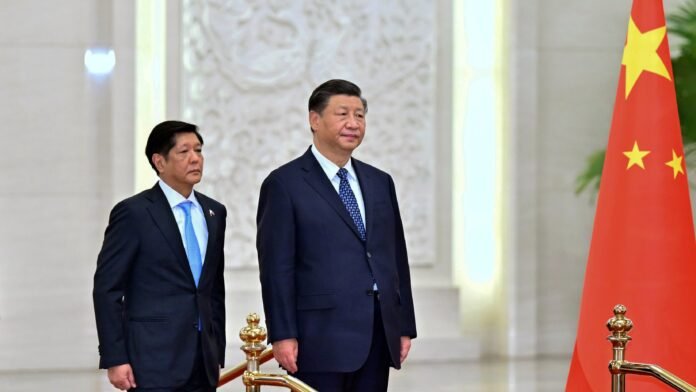In a recent interview on Bloomberg TV, President Marcos of the Philippines emphasized the country’s commitment to avoiding unnecessary provocation of China while also asserting its sovereign rights in the South China Sea. He mentioned that Manila will take measures to carefully navigate this delicate balance, aiming to protect its maritime interests without escalating tensions or risking conflict in the region.
Mr. Marcos stated that invoking the Mutual Defense Treaty between the Philippines and the United States would only be justified in the face of an “existential threat,” emphasizing that it currently serves no purpose beyond that. The pact, established in 1951, obligates both nations to come to each other’s defense in the event of an armed attack.
Despite this obligation, Mr. Marcos emphasized his efforts to avoid triggering the treaty with the Philippines’ primary western ally. He stressed the importance of prioritizing peace and national interests, stating that escalating tensions and invoking the treaty would be counterproductive.
“We are avoiding that, as I said, [because] we think about peace in the national interest. It does not serve any purpose to heighten tensions, to say, ‘Okay, I am invoking the Mutual Defense Treaty,’ and I don’t think anyone wants that… unless the effects are such that… it will become an existential threat to the country,” the President explained.
“We need a stronger defense,” Mr. Marcos acknowledged, referring to the escalating threat from China over the years.
“As the threat has intensified, it’s imperative that we step up our efforts to protect our territory. What people are witnessing is a more vigorous defense of our territorial rights, as acknowledged by both the international community and international law,” he emphasized.
When asked about the United States’ ability to defend the Philippines against China, the President expressed a mix of concern and determination. He emphasized the importance of avoiding a war at all costs, stating that it is the last thing they desire.
“Our goal is to prevent escalation and conflict. We are actively working with our partners and allies to achieve this. Our approach is not about provocation but rather about maintaining stability,” said Mr. Marcos, the President.
He further elaborated, “We are focused on managing tensions and fostering dialogue at various levels. Our aim is to continue these efforts going forward.”
While acknowledging the strong support from Washington and their serious commitment to the treaty, Mr. Marcos also highlighted the risks of solely depending on the United States for assistance, calling it a “dangerous” approach.
The President Emphasizes Self-Reliance, Peace, and Non-Interference
The President recently addressed concerns regarding the country’s relationship with global powers, particularly in light of military agreements and geopolitical tensions. He stressed the importance of self-reliance and avoiding a mindset of dependency on external forces, notably “Big Brother.” Rather than anticipating external intervention during crises, he emphasized the need for internal resilience and self-sufficiency.
Regarding military alliances, the President clarified that the country’s military bases would not be used as launching pads for offensive actions against China, despite agreements like the Philippines-US Enhanced Defense Cooperation Agreement. He underscored that such actions are not on the nation’s agenda unless circumstances drastically change, such as during a state of war. The goal, he explained, is to maintain a delicate but essential peace, steering clear of provocations and conflicts.
On another front, China voiced concerns over perceived US interference in South China Sea disputes. This came after US Secretary of State Antony Blinken reaffirmed a strong security commitment to the Philippines, which Beijing viewed as exacerbating tensions. The Chinese Embassy in Manila accused the US of provoking the Philippines and using maritime freedom as a pretext for its military presence in the region. China urged the US to refrain from exacerbating the situation and to avoid taking sides in regional disputes.
Overall, the President’s statements reflect a nuanced approach to international relations, prioritizing self-determination, peace, and non-interference while navigating complex geopolitical dynamics.
The Chinese Embassy has accused the United States of employing freedom of navigation as a cover for allowing its warships to freely operate in the region. According to them, the US is not safeguarding freedom of navigation but rather seeking the freedom to unleash its military presence in an aggressive manner, thereby displaying true hegemonic behavior.
The embassy further asserted that the actions of US warships and military aircraft, particularly their provocative maneuvers near China’s borders, are indicative of hegemonic intentions aimed at destabilizing the region. They emphasized that it is the United States, and no other nation, that poses a threat to peace and stability in the South China Sea.
During a recent joint news conference with Philippine Foreign Secretary Enrique Manalo, US Secretary of State Antony Blinken reaffirmed America’s unwavering commitment to its defense pact, which includes the protection of all its forces, including the coast guard, across the entire South China Sea region.
China’s expansive territorial claims in the South China Sea, which overlap with the Philippines’ exclusive economic zone, have long been a point of contention. Manila refers to these contested waters as the West Philippine Sea, highlighting the ongoing disputes over sovereignty and maritime rights in the area.
In 2016, the Philippines emerged victorious in a legal dispute against China at the Permanent Court of Arbitration in The Hague. The court ruled against China’s expansive nine-dash-line claims, affirming Manila’s rights to fish and exploit resources in the sea.





